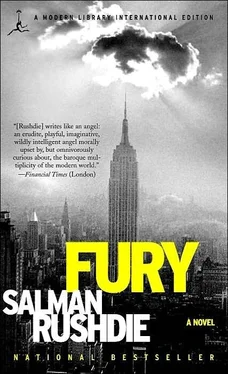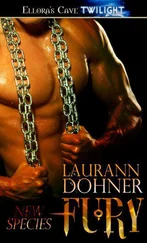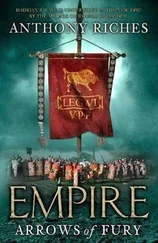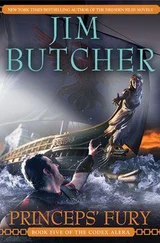Salman Rushdie - Fury
Здесь есть возможность читать онлайн «Salman Rushdie - Fury» весь текст электронной книги совершенно бесплатно (целиком полную версию без сокращений). В некоторых случаях можно слушать аудио, скачать через торрент в формате fb2 и присутствует краткое содержание. Город: New York, Год выпуска: 2002, ISBN: 2002, Издательство: Random House Publishing Group, Жанр: Современная проза, на английском языке. Описание произведения, (предисловие) а так же отзывы посетителей доступны на портале библиотеки ЛибКат.
- Название:Fury
- Автор:
- Издательство:Random House Publishing Group
- Жанр:
- Год:2002
- Город:New York
- ISBN:0679783504
- Рейтинг книги:5 / 5. Голосов: 1
-
Избранное:Добавить в избранное
- Отзывы:
-
Ваша оценка:
- 100
- 1
- 2
- 3
- 4
- 5
Fury: краткое содержание, описание и аннотация
Предлагаем к чтению аннотацию, описание, краткое содержание или предисловие (зависит от того, что написал сам автор книги «Fury»). Если вы не нашли необходимую информацию о книге — напишите в комментариях, мы постараемся отыскать её.
Fury — читать онлайн бесплатно полную книгу (весь текст) целиком
Ниже представлен текст книги, разбитый по страницам. Система сохранения места последней прочитанной страницы, позволяет с удобством читать онлайн бесплатно книгу «Fury», без необходимости каждый раз заново искать на чём Вы остановились. Поставьте закладку, и сможете в любой момент перейти на страницу, на которой закончили чтение.
Интервал:
Закладка:
Solanka himself was affected by it. As he struggled to formulate his thoughts on the perennial problem of authority and the individual, he sometimes heard Dubdub’s voice egging him on. These were statist times, and it was in part Waterford-Wajda who allowed him not to run with the crowd. The state couldn’t make you happy, Dubdub whispered in his ear, it couldn’t make you good or heal a broken heart. The state ran schools, but could it teach your children to love reading, or was that your job? There was a National Health Service, but what could it do about the high percentage of people who went to their doctors when they didn’t need to? There was state housing, sure, but neighborliness was not a government issue. Solanka’s first book; a small volume called What We Need, an account of the shifting attitudes in European history toward the state-vs.-individual problem, was attacked from both ends of the political spectrum and later described as one of the “pre/texts” of what came to be called Thatcherism. Professor Solanka, who loathed Margaret Thatcher, guiltily conceded the partial truth of what felt like an accusation. Thatcherite Conservatism was the counterculture gone wrong: it shared his generation’s mistrust of the institutions of power and used their language of opposition to destroy the old power-blocs to give the power not to the people, whatever that meant, but to a web of fat-cat cronies. This was trickle-up economics, and it was the sixties’ fault. Such reflections contributed greatly to Professor Solanka’s decision to quit the world of thought.
By the late 1970s Krysztof Waterford-Wajda was a bit of a star. Academics had become charismatic. The victory of science, when physics would become the new metaphysics, and microbiology, not philosophy, would grapple with the great question of what it is to be human, was as yet a little way off; literary criticism was the glamour act, and its titans strode from continent to continent in seven-league boots to strut upon an ever larger international stage. Dubdub traveled the world with personal wind effects ruffling his tousled, prematurely silvery locks, even indoors, like Peter Sellers in The Magic Christian. Sometimes he was mistaken by eager delegates for the mighty Frenchman Jacques Derrida, but this honor he would wave away with an English self-deprecating smile, while his Polish eyebrows frowned at the insult.
This was the period in which the two great industries of the future were being born. The industry of culture would in the coming decades replace that of ideology, becoming “primary” in the way that economics used to be, and spawn a whole new nomenklatura of cultural commissars, a new breed of apparatchiks engaged in great ministries of definition, exclusion, revision, and persecution, and a dialectic based on the new dualism of defense and offense. And if culture was the world’s new secularism, then its new religion was fame, and the industry—or, better, the church—of celebrity would give meaningful work to a new ecclesia, a proselytizing mission designed to conquer this new frontier, building its glitzy celluloid vehicles and its cathode-ray rockets, developing new fuels out of gossip, flying the Chosen Ones to the stars. And to fulfill the darker requirements of the new faith, there were occasional human sacrifices, and steep, wing-burning falls.
Dubdub was an early Icarus-like flameout. Solanka saw little of him in his golden years. Life separates us with its apparently casual happenstance, and when one day we shake our heads as if waking from a reverie, our friends have become strangers and can’t be retrieved: “Does nobody here know poor Rip van Winkle?” we ask plaintively, and nobody, any longer, does. So it was with the two old college pals. Dubdub was mostly in America now, some sort of a chair had been invented for him at Princeton, and there were phone calls back and forth at first, then Christmas and birthday cards, then silence. Until, one balmy Cambridge summer evening in 1984, when the old place was its most perfectly storybook self, an American woman knocked on the oak, the outer door of Professor Solanka’s rooms—formerly occupied by E. M. Forster—on the staircase, above the students’ bar. Her name was Perry Pincus; she was small-boned, dark, big-breasted, sexy, young, but fortunately not young enough to be a student. All these things quickly made a good impression on Solanka’s melancholy consciousness. He was recovering from the end of a first, childless marriage, and Eleanor Masters was some way in the future. “Krysztof and I got to Cambridge yesterday,” Perry Pincus said. “We’re at the Garden House. Or, Ira at the Garden House. He’s in Addenbrooke’s. Last night he cut his wrists. He’s been very depressed. He asked for you. Can I get a drink?”
She came in and took in her surroundings appreciatively. The houses, little and largeish, and the humanoid figures sitting everywhere, tiny figures in the houses, of course, but also others outside them, on Professor Solanka’s furniture, in the corners of his rooms, soft and hard figures, male and female, also both largeish and small. Perry Pincus was carefully—if heavily—painted, her eyelids weighed down by heavy black eyelash extensions, and she wore full sex-kitten battle dress, a short tight outfit, stiletto heels. Not the customary attire of a woman whose lover has just attempted suicide, but she made no excuses for herself. Perry Pincus was a young Eng Lit person who liked to fuck the stars of her increasingly uncloistered world. As a devotee of the casual encounter, consequences (wives, suicides) were not her thing. Yet she was bright, lively, and like all of us believed herself to be an acceptable person, even, perhaps, a good one. After her first shot of vodka—Professor Solanka always kept a bottle in the freezer—she said, matter-of-factly, “It’s clinical depression. I don’t know what to do. He’s sweet, but I’m no good at sticking by men in trouble. I’m not the nurse type. I like a take-charge guy.” After two shots she said, “I think he was a virgin when he met me. Is that even possible? He didn’t admit it, of course. Said back home he was quite a catch. That turns out to be true, financially speaking, but I’m not the money-grubbing type.” After three shots she said, “All he ever wanted was to get a b.j. or, alternatively, fuck me in the ass. Which was okay, you know, whatever. I get a lot of that. It’s one of my looks: boy-with-tits. It gets the sexually confused guys. Trust me on this. I know.” After four shots, she said, “Talking of sexually confused, Professor, great dolls.”
He decided he was hungry, but not this hungry, and gently coaxed her downstairs onto King’s Parade and into a taxi. She stared at him through the window with smudged eyes and a puzzled expression, then leaned back, closed her eyes, faintly shrugged. Whatever. Afterward he learned that in her own way Perry “Pinch-ass” was famous on the global literary circuit. You could be famous for anything nowadays, and she was.
The next morning he visited Dubdub, not in the main hospital, but in a good-looking old brick building standing in green, leafy grounds a little way down Trumpington Road: like a country house for the hopeless. Dubdub stood at a window smoking a cigarette, wearing crisp, wide-striped pajamas under what looked like his old school dressing-gown, a worn, stained thing that was perhaps playing the part of a security blanket. His wrists were bandaged. He looked heavier, older, but that goddamn society smile was still there, still on parade. Professor Solanka thought that if his own genes had sentenced him to wear such a mask every day of his life, he’d have been in here with bandaged wrists long ago.
“Dutch elm disease,” Dubdub said, pointing to the stumps of trees. “Frightful business. The elms of old England, lost and gone.” Lorst and gorn. Professor Solanka said nothing. He hadn’t come to talk about trees. Dubdub turned toward him, got the point. “Expect nothing and you won’t be disappointed, eh,” he murmured, looking boyishly shamefaced. “Should’ve listened to my own lectures.” Still Solanka didn’t answer. Then, for the first time in many years, Dubdub put aside the Old Etonian act. “It’s to do with suffering,” he said flatly. “Why do we all suffer so. Why is there so much of it. Why can’t you ever stop it. You can build dikes, but it always comes oozing through, and then one day the dikes just give way. And it’s not just me. I mean, it is me, but it’s everyone. It’s you, too. Why does it go on and on? It’s killing us. I mean, me. It’s killing me.”
Читать дальшеИнтервал:
Закладка:
Похожие книги на «Fury»
Представляем Вашему вниманию похожие книги на «Fury» списком для выбора. Мы отобрали схожую по названию и смыслу литературу в надежде предоставить читателям больше вариантов отыскать новые, интересные, ещё непрочитанные произведения.
Обсуждение, отзывы о книге «Fury» и просто собственные мнения читателей. Оставьте ваши комментарии, напишите, что Вы думаете о произведении, его смысле или главных героях. Укажите что конкретно понравилось, а что нет, и почему Вы так считаете.











